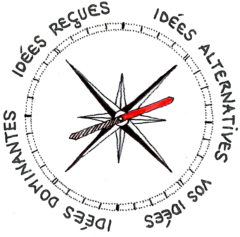Michael Albert
Extrait de Michael Albert, Parecon, Verso, London/new York, 2003, pp. 89-90.
Ownership
An apt and true reply was given to Alexander the Great by a pirate who had been seized. For when that king had asked the man what he meant by keeping hostile possession of the sea, he answered with bold pride. « What thou meanest by seizing the whole earth; but because I do it with a petty ship, I am called a robber, whilst thou who dost it with a great fleet art styled emperor. — St, Augustine
There has to be a shortest and simplest chapter in every book. This is ours. Alone among chapters in this section it consists almost entirely of negation rather than positive envisioning. It is also trivially simple but nonetheless essential. In every economy there are tools, workplaces, resources and other means of production with which we combine our efforts to produce new items for consumption. Historically, having a few members of society own these means of production, décidé on their use, and dispose over the output and revenues they generate has meant that this privileged group has always had more wealth, more income, and more économie power than others in society. There are owners and non-owners. The non-owners may as a group have further categories of différentiation, but this does not complicate the current issue. By separating ownership from non-ownership of the means of production, society places some of its members on top and other below. Our commitment to equity, solidarity, diversity, proper distribution of influence, and classlessness precludes ail this. So what is our alternative?
There are two issues:
– No one should have disproportionate say due to having a different relationship to owning means of production than anyone else.
– No one should have excessive income. nor for that matter, should anyone reçoive anything other than rémunération according to effort and sacrifice, or, if unable to work, according to need. Never should anyone’s income be correlated to their owning means of production.
There is a simple logical step we can take to accomplish both these aims most quickly arid easily. We simply remove ownership of the means of production from the economic picture. We can think of this as deciding that no one owns the means of production. Or we can think of it as deciding that everyone owns a fractional share of every single item of means of production equivalent to what every other person owns of that item. Or we can think of it as deciding that society owns ail the means of production but that it has no say over any of the means of production nor any daim on their output on that account.
In short, we simply remove ownership of the means of production as an economic considération. Property in the form of means of production becomes a non-thing. It has no bearing in a participatory economy. No one has any ownership of means of production that accrues to him or her any rights, any responsibilities, any wealth, or any income different from what the rest of the economy warrants for him or her. No one has wealth, income, or economic influence different than what anyone else has due to having different ownership of means of production. It is not just that ownership of the means of production changes hands from what we now know. It doesn’t move from one set of actors to some other set. In a participatory economy ownership of the means of production no longer even exists as a concept. It is banished. and with it goes the category “capitalist.” No one is distinguishable from anyone else by having different ownership of means of production. There is no separate concept of such ownership, and therefore no class of owners, and therefore no capitalists—nor is there any sector of folks acting as agents for others in administering means of production through the state. The whole idea and dynamic are gone.
Of course, this is not a full economic description of an alternative to private ownership, by any means. We cannot just negate and remove and call what remains something new. It is one needed step in arriving at something new, but not the total picture. Means of production are no longer owned in a participatory economy, but we still have to worry about the allocation of means of production to different production processes and about dispensation over the use of means of production. It is just that we have to do this having removed ownership from the equation, and we thus have to corne up with an alternative to some people having deeds to this or that factory, assembly line, coal mine, and so on. As to how we accomplish this, that cornes to light in the next few chapters.
